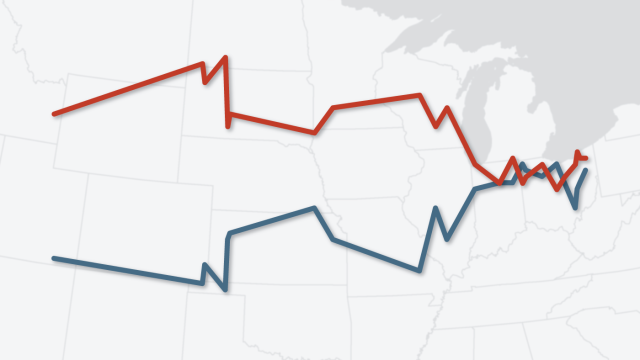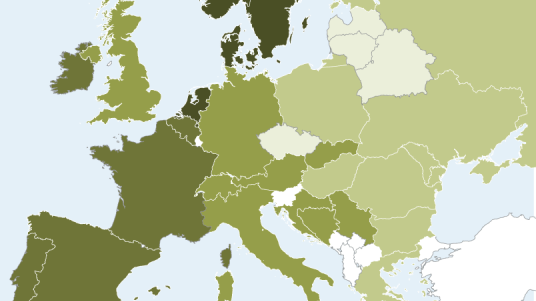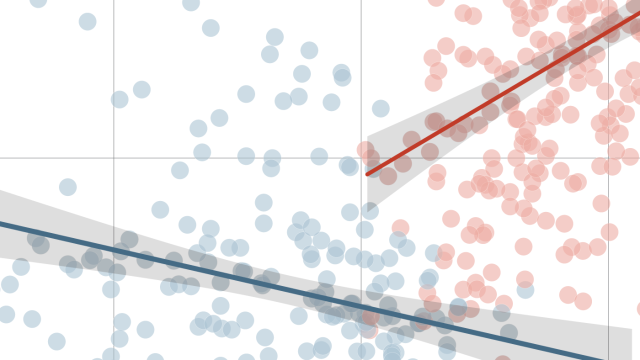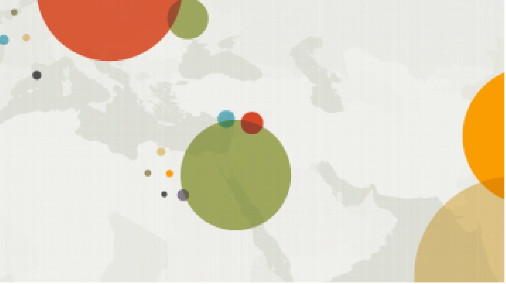

In Tight Presidential Race, Voters Are Broadly Critical of Both Biden and Trump
A defining characteristic of the 2024 presidential race is that voters overall have little confidence in either candidate across a range of key traits, including fitness for office, personal ethics and respect for democratic values. Some 49% of registered voters say that, if given the chance, they would replace both candidates on the ballot.
Latest Publications
-
In Tight Presidential Race, Voters Are Broadly Critical of Both Biden and Trump
Voters are evenly split in their support for Trump (49%) and Biden (48%), but overall lack confidence in both on a range of traits.
Most Popular
Politics & Policy

Rising Numbers of Americans Say Jews and Muslims Face a Lot of Discrimination
40% of U.S. adults say there’s a lot of discrimination against Jews in society, and 44% say there’s a lot of discrimination against Muslims.
Features
International Affairs

Younger Americans stand out in their views of the Israel-Hamas war
33% of adults under 30 say their sympathies lie either entirely or mostly with the Palestinian people, while 14% say their sympathies lie with the Israeli people.

Many in East Asia say men and women make equally good leaders, despite few female heads of government
When Taiwanese President Tsai Ing-wen’s term ends in May, only one woman will serve as head of government anywhere in Asia, excluding the Pacific Islands.

What Can Improve Democracy?
Amid growing discontent with the state of democracy globally, we asked over 30,000 people what changes would make their democracy work better.

How Americans view the conflicts between Russia and Ukraine, Israel and Hamas, and China and Taiwan
74% of Americans view the war between Russia and Ukraine as important to U.S. national interests – with 43% describing it as very important.
Internet & Technology

6 facts about Americans and TikTok
62% of U.S. adults under 30 say they use TikTok, compared with 39% of those ages 30 to 49, 24% of those 50 to 64, and 10% of those 65 and older.

Americans’ use of ChatGPT is ticking up, but few trust its election information
About one-in-five U.S. adults have used ChatGPT to learn something new (17%) or for entertainment (17%).

WhatsApp and Facebook dominate the social media landscape in middle-income nations
Across eight countries surveyed in Latin America, Africa and South Asia, a median of 73% of adults say they use WhatsApp and 62% say they use Facebook.
Race & Ethnicity

How Hispanic Americans Get Their News
U.S.-born Latinos mostly get their news in English and prefer it in English, while immigrant Latinos have much more varied habits.

Key facts about Asian Americans living in poverty
Burmese (19%) and Hmong Americans (17%) were among the Asian origin groups with the highest poverty rates in 2022.

Latinos’ Views on the Migrant Situation at the U.S.-Mexico Border
U.S. Hispanics are less likely than other Americans to say increasing deportations or a larger wall along the border will help the situation.

Black Americans’ Views on Success in the U.S.
While Black adults define personal and financial success in different ways, most see these measures of success as major sources of pressure in their lives.

5 facts about Black Americans and health care
More Black Americans say health outcomes for Black people in the United States have improved over the past 20 years than say outcomes have worsened.
Our Methods

U.S. Surveys
Pew Research Center has deep roots in U.S. public opinion research. Launched as a project focused primarily on U.S. policy and politics in the early 1990s, the Center has grown over time to study a wide range of topics vital to explaining America to itself and to the world.

International Surveys
Pew Research Center regularly conducts public opinion surveys in countries outside the United States as part of its ongoing exploration of attitudes, values and behaviors around the globe.

Data Science
Pew Research Center’s Data Labs uses computational methods to complement and expand on the Center’s existing research agenda.

Demographic Research
Pew Research Center tracks social, demographic and economic trends, both domestically and internationally.

Decoded
Pew Research Center tracks social, demographic and economic trends, both domestically and internationally.
Our Experts
“A record 23 million Asian Americans trace their roots to more than 20 countries … and the U.S. Asian population is projected to reach 46 million by 2060.”

Neil G. Ruiz,
Head of New Research Initiatives
Methods 101 Videos

Methods 101: Random Sampling
The first video in Pew Research Center’s Methods 101 series helps explain random sampling – a concept that lies at the heart of all probability-based survey research – and why it’s important.
Signature Reports

Race and LGBTQ Issues in K-12 Schools
Representative Democracy Remains a Popular Ideal, but People Around the World Are Critical of How It’s Working
Americans’ Dismal Views of the Nation’s Politics
Measuring Religion in China
Diverse Cultures and Shared Experiences Shape Asian American Identities
Parenting in America Today
Editor’s Pick

Religious ‘Nones’ in America: Who They Are and What They Believe
Among young adults without children, men are more likely than women to say they want to be parents someday
Fewer young men are in college, especially at 4-year schools
About 1 in 5 U.S. teens who’ve heard of ChatGPT have used it for schoolwork
Women and Political Leadership Ahead of the 2024 Election
#BlackLivesMatter Turns 10
Immigration & Migration

Latinos’ Views on the Migrant Situation at the U.S.-Mexico Border
Migrant encounters at the U.S.-Mexico border hit a record high at the end of 2023
How Americans View the Situation at the U.S.-Mexico Border, Its Causes and Consequences
What we know about unauthorized immigrants living in the U.S.
Latinos’ Views of and Experiences With the Spanish Language
Social Media

How Teens and Parents Approach Screen Time
5 facts about how Americans use Facebook, two decades after its launch
A declining share of adults, and few teens, support a U.S. TikTok ban
81% of U.S. adults – versus 46% of teens – favor parental consent for minors to use social media
How Americans View Data Privacy
Copyright 2024 Pew Research Center


















